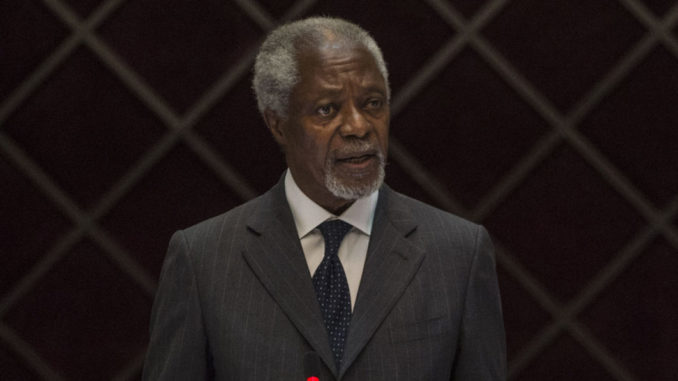
Funny enough, when the news of Kofi Annan’s passing broke 2 days ago, my mind immediately flashed back to him leading the entire United Nations system in mourning a tragedy. It was quite an elaborate affair, apparently consulted with grief management experts, who insisted it had to be grand, to match the dimension of the tragedy. Candlelight processions, memorials complete with a flower pile, individual memorial services for each of the departed depending on their faith, a pamphlet of tributes quickly put together and available for free pick at different points in the headquarters premises, and a packed live concert by Brazilian musician Gilberto Gil, compatriot of one of the victims.
Then I woke up Sunday and realized it was the anniversary of the incident that led to that mass mourning, an incident in which over 20 staff members lost their lives – among them a senior official who was Mr Annan’s close personal friend from their days as fresh recruits back in the day in Geneva. You don’t have to know the individuals, in such circumstances, to get sucked into the grief. But he had also been my boss when I briefly worked in East Timor, organising the 2001 constituent assembly elections.
All sorts of memories well up as I write – I was barely 10 days in New York in 2003, having decided after years of working in “the field” to give “HQ” a try; I felt rudderless – alone in a crowded city and among a crowd of mourning colleagues; I recall how the grief brought people together in strange, unexpected ways – a colleague I didn’t have a particularly warm relationship with, from a prior mission in Angola who, picking me out as the only known face in the crowd at one of the memorials, leans on me, and proceeds to drench me in tears. And how she called my extension days later just to check up on me.
UN staff come in harm’s way pretty much every day (like all human beings!) but the bombing of UN premises in Iraq in 2003 hit the organisation like an “upper cut”, and marked a turning point – people killed simply and only because they were identified with the UN; never again could “we need to be accessible to the people we serve” be used to justify taking chances with security. Kind of sad…
Sadder still is that such occurrences of UN personnel being targeted have since become quite commonplace – ambushes of convoys, or attacks on military posts in Mali or CAR, kidnappings in Afghanistan, consultants abducted and beheaded in DEC, a UN compound filled with displaced people seeking protection overrun and taken over by armed men in South Sudan; and of course the odd car bomb here and there, including (bringing it even closer to home) the savage, gratuitous attack on UN House in Abuja a few years ago.
It sometimes takes an effort not to feel under siege. Very often, in my line of business (electoral assistance), we have to step in in the immediate aftermath of a conflict (sometimes while the conflict is still alive in parts of a country), before the rules of normal social intercourse get fully restored. An election has to be organised under a peace deal, and planning has to start immediately. I can’t hide that I’ve quite reflexively, almost unconsciously, sought to reduce my exposure, and I do tend to shy away from some types of potentially more assignments – yes, I wouldn’t do Somalia today!
A mere 19 years ago, (mere? I’m growing old!) I didn’t think twice about going to a country I’d never before visited, where 4 armed forces were still “in situ” (and potentially active) – two foreign armies, each of them supporting either side to a violent domestic conflict (my egbon Ademola Araoye will surely argue me to exhaustion that that was no domestic conflict – but let’s keep things simple, and call it that for now). Predictably, things got horribly ugly about a month after I left, with the President finally deposed (he eventually came back to power through an election, but ended up savagely butchered in a revenge killing by forces whose commander in chief he was supposed to be). Up till today, each time I am driven along that stretch from the airport into town in Bissau (and it’s one place I’ve had to go back to over & over again, for reasons that have little to do with affection for the place), I still get goose pimples, recalling the check points at regular intervals on the road, and of course eventually reaching the “front line”, where the two domestic forces, still fully armed, eyeballed each other all day long, at a distance of some 20 metres, with what appeared to me like ganja-dilated pupils. And that was just myself, a driver and an unarmed UN Security Officer in the car – with a worn, little, blue flag fluttering at the tip of a Codan radio antenna for comfort.
Deep workplace grief has popped up without there being an aggressor too. A careless plane crash in Kinshasa deprived me of 6 dear colleagues; an earthquake in Haiti….. chai too hard to talk about.
So going back to Mr Annan, here I am almost overwhelmed by the emotion of my suddenly realising the irony of him dying one day short of the 15th anniversary of an incident he himself had to get help to process, while simultaneously having to help the far-flung body of personnel of the UN to process it too, through those events mentioned above.
He was a truly great man; Ghana’s gift to the world. May his soul rest in Peace – and may his dear ones be consoled.
Adegbola is the Chief Electoral Officer, UN Office to the AU, Addis Ababa
END

Be the first to comment